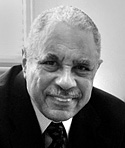Thomas Jefferson Anderson
Presented by Barry A. G. Greenfield ’56, Trustee, for Doctor of Music
 Composer Thomas Jefferson “T.J.” Anderson demonstrates the capacity of a single soul to encompass the world. Embracing European modernism and myriad expressions of the African American experience, Anderson transcends both to explore new realms of sound, interdisciplinarity, and audience interaction. “Anderson is an individual and compelling compositional voice,” wrote a Boston Globe critic, whose “personality is so strong that it can unify diverse elements.” Anderson may be best-known for his orchestration of Scott Joplin’s opera Treemonisha, which premiered in 1972, but his original compositions constitute a towering contribution to music. His first significant work was an overture finished in 1958, and his most recent is 2004’s A Song for Elma Lewis, a setting for soprano and piano of a text by his son, T.J. Anderson III. The 80-plus works in between include operas, symphonies and other orchestral works, band music, all manner of chamber music, and choral pieces. Anderson’s “predilection for rhythmic complexity and his imaginative use of instrumental color are particularly notable,” as The New Grove Dictionary of Music and Musicians states, but equally remarkable are his boldness with form and his generosity toward performers and audiences. Born in Coatesville, Pa., Anderson began playing the violin as a child and quickly manifested an omnivorous musical appetite; at age 14 he spent a summer on the road as a trumpeter with a jazz band. Anderson received degrees from West Virginia State College, Pennsylvania State University and the University of Iowa, where he earned a Ph.D. in composition. He has taught in public school and academe, and retired in 1990 as the Austin Fletcher Professor of Music Emeritus at Tufts University. From 1968 to 1971, he was composer in residence with the Atlanta Symphony Orchestra, and his many commissions include works for the Bill T. Jones/Arnie Zane Dance Company and cellist Yo Yo Ma. A resident of Chapel Hill, N.C., Anderson now composes full time. He was inducted into the American Academy of Arts and Letters on May 18.
Composer Thomas Jefferson “T.J.” Anderson demonstrates the capacity of a single soul to encompass the world. Embracing European modernism and myriad expressions of the African American experience, Anderson transcends both to explore new realms of sound, interdisciplinarity, and audience interaction. “Anderson is an individual and compelling compositional voice,” wrote a Boston Globe critic, whose “personality is so strong that it can unify diverse elements.” Anderson may be best-known for his orchestration of Scott Joplin’s opera Treemonisha, which premiered in 1972, but his original compositions constitute a towering contribution to music. His first significant work was an overture finished in 1958, and his most recent is 2004’s A Song for Elma Lewis, a setting for soprano and piano of a text by his son, T.J. Anderson III. The 80-plus works in between include operas, symphonies and other orchestral works, band music, all manner of chamber music, and choral pieces. Anderson’s “predilection for rhythmic complexity and his imaginative use of instrumental color are particularly notable,” as The New Grove Dictionary of Music and Musicians states, but equally remarkable are his boldness with form and his generosity toward performers and audiences. Born in Coatesville, Pa., Anderson began playing the violin as a child and quickly manifested an omnivorous musical appetite; at age 14 he spent a summer on the road as a trumpeter with a jazz band. Anderson received degrees from West Virginia State College, Pennsylvania State University and the University of Iowa, where he earned a Ph.D. in composition. He has taught in public school and academe, and retired in 1990 as the Austin Fletcher Professor of Music Emeritus at Tufts University. From 1968 to 1971, he was composer in residence with the Atlanta Symphony Orchestra, and his many commissions include works for the Bill T. Jones/Arnie Zane Dance Company and cellist Yo Yo Ma. A resident of Chapel Hill, N.C., Anderson now composes full time. He was inducted into the American Academy of Arts and Letters on May 18.